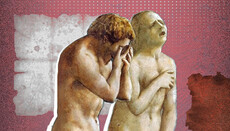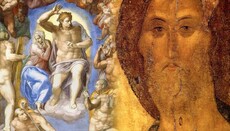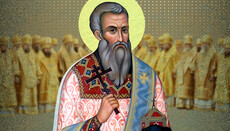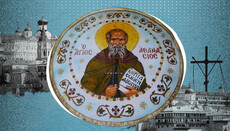“O Lord, how wondrous are thy works”: an explanation of Psalm 103 at Vespers

Why is Psalm 103 called “introductory”? Let us examine its “difficult” passages: who are the “wild ass,” the “stork,” and the “dragon,” and why the priest reads the lamp-lighting prayers in secret.
In the previous article, we discussed the origin of the service of Vespers – its general meaning and structure. Now it is time to focus on certain details that will help us perceive this evening service as a unified act of praise and thanksgiving for the day that has passed, the beginning of a new liturgical day, and an anticipation of the coming of the Savior.
“Bless the Lord, O my soul”: A hymn to creation
Vespers always begins with Psalm 103, called the “introductory psalm” because it opens the new liturgical day. The entire psalm is filled with praise for how wonderfully the world is arranged and with awe before the wisdom of the Creator revealed in the order of nature.
In present practice, at the All-Night Vigil the psalm is sung by the choir in abbreviated form with refrains such as “Blessed art Thou, O Lord,” “O Lord, how manifold are Thy works,” and “Glory to Thee, O Lord, who hast made all things.” At ordinary Vespers, it is read by the reader.
According to the Typikon, however, it should be read by the presiding priest (and, in home prayer, by the head of the family), for the psalm is marked by special solemnity.
We shall not reproduce the entire psalm here but will draw attention to several passages that may be difficult to understand. In its opening verses, the psalm glorifies the Creator who clothes Himself with light as with a garment and stretches out the heavens like a tent. It speaks of the separation of the waters, the motion of clouds and winds, the cycle of water in nature, and how the Lord orders the visible world.
The psalm, as it were, follows the days of creation, singing of the appearance of light, the heavens, the earth, and the elements through which the wisdom and majesty of God are revealed.
Difficult passages: Who are the “wild ass” and the “stork”?
In verse 6 there is a mistranslation in the Church Slavonic text: “The waters shall stand upon the mountains.” The original sense is “in the heights” (that is, in the clouds above) the waters are gathered.
A similar nuance appears in verse 8: “The mountains rise up, and the valleys sink down…” – meaning that the waters ascend upward (evaporate) and descend through the valleys to the place appointed for them.
The psalm then continues to speak of water as the source of life on earth – God sets its boundaries, gives drink to the land, and sustains the living creatures, beasts, and birds. Verse 11 mentions the onagri (a kind of Persian horse resembling wild asses), who “quench their thirst.”
Thus the psalm unfolds a picture of the created world filled with harmony and thankful movement of life.
At those same streams flowing among the hills, the birds of the air dwell – resting and singing among the stones and rocks. From His heights God waters the mountains and the earth, causing grass to grow for cattle and plants for human use. Everything breathes abundance: wine gladdens the heart, oil anoints the face, and bread strengthens man’s heart.
The trees of the field and the mighty cedars of Lebanon, planted by the Lord, are full of sap; in their branches the birds make their nests. Verse 17 refers to “the stork’s house” – another case of translation difficulty. The Greek word means “stork,” so the sense is that the stork’s nest is built high above the others.
Once again, we see before us a calm and spacious picture of the universe, where everything has its appointed place: the high mountains are a refuge for the deer, the cliffs a shelter for the hares. The moon marks the seasons, and the sun knows the hour of its setting. With the coming of night the world changes – from the forests emerge the beasts of prey; lions roar, seeking their food from God. Then the sun rises again – the beasts withdraw to their dens, and man goes forth to his work until evening.
Everything is filled with order and measure, all is permeated with the wisdom of the Creator.
The serpent playing in the sea
Verse 26 again presents a challenging image: “There go the ships: there is that Leviathan, which Thou hast made to play therein.” The serpent or Leviathan (Greek drákon) is likely a great sea creature. The Slavonic verb “rugatisya” means “to laugh,” “to play,” or “to frolic.”
Thus the sense is that this powerful sea creature seems to play in the very sea that might terrify others. The verse could thus be rendered: “There is that serpent which Thou hast made to play therein.”
The psalm then draws to its majestic conclusion. All living things look to the Creator in expectation – from Him they receive their food; when He hides His face, their life ceases and they return to dust. But when He sends forth His Spirit, the earth is renewed.
To all this we respond with exclamation: “I will sing unto my God as long as I live!”
The psalm ends as a prayer for the transformation of the world – that iniquity may vanish from the earth.
The lamp-lighting prayers: why the priest reads them secretly
During the reading of Psalm 103, the priest recites seven lamp-lighting prayers. Originally, each of these had its own place within Vespers. In them, we give thanks for the day that has passed and ask to be granted “an evening of praise,” “a peaceful night,” and “sleep for the rest of our infirmity.”
These prayers are not the personal petitions of the priest but prayers on behalf of the entire congregation, which is why they were once read aloud so that all present could pray with them.
Later, however, under the influence of the growing custom of reading the Eucharistic prayers quietly, the lamp-lighting prayers also began to be read silently. (This custom will be discussed in later articles.) When these prayers – so called because they were read at the lighting of the lamps – began to be read privately, their place in the public prayer was taken by the litanies.
The Great Litany and the Prayer of St. Theophan the Recluse
It is therefore natural that the Great (or Peace) Litany follows next in the service. It consists of a series of petitions proclaimed by the deacon or priest, to which the people (or choir) respond: “Lord, have mercy.”
The petitions of the litany may also be used in private prayer. St. Theophan the Recluse, advising laypeople to perform the services of the daily cycle at home, suggested turning these petitions into short personal prayers:
“Grant me, O Lord, this day (in the evening: this evening; at night: this night) to be perfect, holy, peaceful, and sinless!
Grant me, O Lord, an angel of peace, a faithful guide, guardian of my soul and body!
Grant me, O Lord, forgiveness and remission of my sins and transgressions!
Grant me, O Lord, what is good and profitable for my soul and body!
Grant me, O Lord, to complete the rest of my life in peace and repentance!
Grant me, O Lord, a Christian end to my life and a good answer at Thy dread judgment!”
Step by step, Vespers reveals the depth of its meaning.
As we have already said, it grew out of the ancient Eucharistic gatherings, and therefore its essential tone is one of thanksgiving, praise, and expectation.
In this article, we have focused mainly on the aspect of Vespers in which thanksgiving is heard. Next time, we shall turn our attention to another of its chords – the anticipation and longing for the Unwaning Light.











